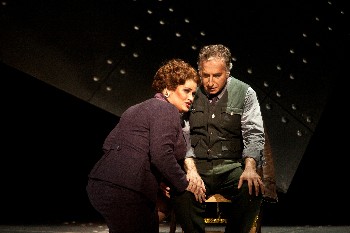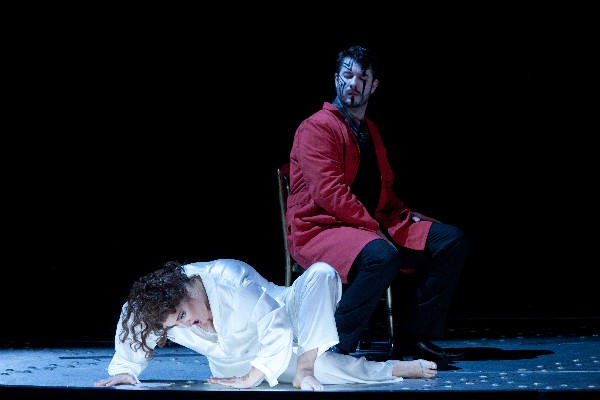Classical Music Review: The Boston Lyric Opera — An Efficient and Satisfying “Macbeth”
The Boston Lyric Opera’s new production of Macbeth, with sets designed by John Conklin, is based on elements of a New York City Opera production and plays up the macabre elements of the story, which are many.
Macbeth. Music by Giuseppe Verdi. Libretto by Francesco Maria Piave and Andrea Maffei. Staged by the Boston Lyric Opera at the Shubert Theatre, Boston, MA, through November 13.
By Jonathan Blumhofer
In the 19th century, William Shakespeare’s two greatest musical champions likely were the composers Hector Berlioz and Giuseppe Verdi. Both drew inspiration from the Bard to create music of tremendous depth and drama in which audiences delight to this day. Last month Opera Boston opened its season with performances of Berlioz’s final Shakespeare adaptation, Beatrice et Benedict; beginning last Friday, the Boston Lyric Opera (BLO) commenced its 35th anniversary season with Verdi’s first, Macbeth, in a new staging directed by David Schweizer and conducted by BLO music director David Angus.
Macbeth, Verdi’s 10th opera, premiered in 1847, when its composer was 33 years old; Verdi heavily revised the score in 1865 and, according to a program note written by Angus, continued to “tinker” with it throughout his life. BLO’s production is basically an adaptation of the second version: sections of music that were written to accompany big scene changes and ballet music that holds up the action of the drama have been removed while the vocal portions of the score remain largely intact. Musically, the result is an efficient and satisfying production that clocks in at just over two hours, including intermission.
Mr. Schweizer’s new production, with sets designed by John Conklin, is based on elements of a New York City Opera production and plays up the macabre elements of the story, which are many. The action is removed from Scotland to a modern, industrial setting that at times reminded me of Fritz Lang’s Metropolis. Even before the opera begins, the audience is welcomed to the theater by a red curtain covering the stage, partially obscuring a dozen or so corpses hanging upside-down from the ceiling. During the short, orchestral prelude, several ghoulishly dressed figures appear from underneath the curtain preparing a new body to add to the collection, and it is duly raised to the rafters.
In a recent interview, Mr. Schweizer expounded his view that the chorus of witches who open the opera and reappear throughout are characters of vital importance, guiding the actions of Macbeth and Lady Macbeth in an exploration of the darkest extremes of human behavior. The way Mr. Schweizer realizes this on stage is by incorporating the entire cast, save Macbeth and his immediate entourage, into the Witches Chorus. Thus, Macbeth, Lady Macbeth, Macduff, Banquo, and the others can be seen as pawns in a terrifying game played (we can presume) for the edification of the mysterious witches.
While, conceptually, I think this a vivid and unsettling approach to interpreting the drama, in practice I felt that it often cluttered the stage with non-singing characters who were then given little to do except perform choreography involving wildly gesticulating hand and arm motions. Rather than enhancing the drama, I found such mannerisms—which culminated in a thoroughly obnoxious episode at the end of Act Two that had the chorus conducting and dancing to the beat of the orchestra—distracting.
Overall, too, I prefer operatic stagings that feature less stylized acting and more action. Lady Macbeth suffered perhaps the most of the main characters from the staging in Acts One and Two, which had her strutting about the slanted set in high heels and holding poses that added little to my understanding of the work’s drama or her character.
Staging issues notwithstanding, Verdi’s glorious music was very much at the center of this production. If anything, hearing this nearly 165-year-old score in a contemporary setting emphasized the timelessness of its themes and the enduring brilliance of the composer’s music. Throughout the performance, Verdi’s handling of scary text continually impressed me; Often (as in the case of Lady Macbeth’s Act One aria “Or tutti sorgette”), malicious lyrics are set to lilting, light-hearted accompaniment, and the cumulative effect is one of rich, psychological complexity.
In the opera’s title role, David Sutin proved an ideal Macbeth. Dressed throughout the opera in a brown, leather jacket, his appearance brought to mind any number of 20th-century dictators, a reference that was reinforced by the chorus of oppressed, Scottish refugees in Act Four and Macbeth’s eventual demise at the end of the opera (which, like all character deaths in this production, happened onstage). Though Mr. Sutin’s opening dialogue with Darren Stokes’s Banquo began cautiously, he soon warmed to the role.
For me the highlight of his performance was the concluding scene of Act Two, where Macbeth is afflicted with visions of Banquo’s ghost during a banquet. In that scene, Mr. Sutin’s portrayal of Macbeth’s degeneration from confident ruler to man on the brink of madness was a wonder to behold, the shadings of his voice shadowing the inner turmoil of this complex but weak-willed character to great effect. Similarly, his fourth act aria (“Pietà, rispetto, amore”) was sensitively sung and made his transition from manipulated husband to paranoid tyrant thoroughly convincing.
I would like to be similarly enthusiastic about Carter Scott’s Lady Macbeth. The role of Lady Macbeth is one of the most demanding that Verdi created and requires a singer of enormous musical ability as well as dramatic capacity. Ms. Scott, who was making her BLO debut, possesses a stage presence that suggests she is just such a soprano. However, her singing in this production left much to be desired. To begin, her voice is afflicted with a heavy vibrato that obscures pitch and that I found to be highly distracting. There were also some rather glaring intonation issues in her performance of this (admittedly difficult) part. True, there is a famous letter from Verdi concerning Macbeth in which he wrote that he would rather have unmusical singers than trained voices in order to advance the drama, and perhaps if Ms. Scott had embraced her role as thoroughly as Mr. Sutin took on his, there would be less about which to complain. However, she didn’t.
There were moments in Ms. Scott’s performance where these frustrating tendencies disappeared and the result was music and drama making of a high caliber, particularly in Lady Macbeth’s Act Two aria in which she praises the powers of darkness (“La luce langue”). In the famous fourth act sleepwalking scene, though, Ms. Scott was back to her original form. A telling contrast can be drawn with Mr. Sutin’s corresponding mad scene at the end of Act Two. Mr. Sutin’s voice gave great depth to his character’s fragile psychological state; Ms. Scott’s tone and delivery were identical to those in her brindisi, delivered when her character was in full command of her faculties in Act Two. In a few bars towards the end of the sleepwalking scene, Ms. Scott took to the role, and her voice evoked shadings of terror and brokenness. I left the theater wishing her entire performance had been up to that level.
In the lesser but important role of Banquo, Mr. Stokes proved highly sympathetic. Though his voice in its lower range tended to get covered up when singing in ensembles, his Act Two aria of foreboding (“Come dal ciel precipita”) was beautifully sung; indeed, it was one of the highlights of the production.
Excellent, too, was Richard Crawley’s Macduff. Macbeth is an anomaly among Verdi operas in that its only tenor roles are for secondary characters (Macduff and Malcolm, a small part ably sung by John Irvin). Mr. Crawley’s performance of Macduff’s fourth act aria lamenting the slaughter of his wife and unborn child (“Ah, la paterna mano”) made me wish Verdi had expanded the role just for this singer.
The BLO Chorus was strong throughout. I would like to have heard more drive and energy in the second part of the Witches Chorus that opens the opera, but as things stood their delivery was effective. It also would have been nice if Mr. Angus and the ensemble had taken a bit more time to enjoy some of the big choral climaxes (particularly in the Act One finale), though overall I thought their tempos satisfactory.
The BLO Orchestra, which draws on some of the finest players in the region, was uniformly excellent. Though in Macbeth (as often in Verdi) the orchestral writing is often relegated to an accompanimental role, the Orchestra proved sensitive and effective in setting the moods in each of the opera’s several scenes.
Jonathan Blumhofer is a composer and violist who has been active in the greater Boston area since 2004. His music has received numerous awards and been performed by various ensembles, including the American Composers Orchestra, Kiev Philharmonic, Camerata Chicago, Xanthos Ensemble, and Juventas New Music Group. Since receiving his doctorate from Boston University in 2010, Jon has taught at Clark University, Worcester Polytechnic Institute, and online for the University of Phoenix, in addition to writing music criticism for the Worcester Telegram & Gazette.


